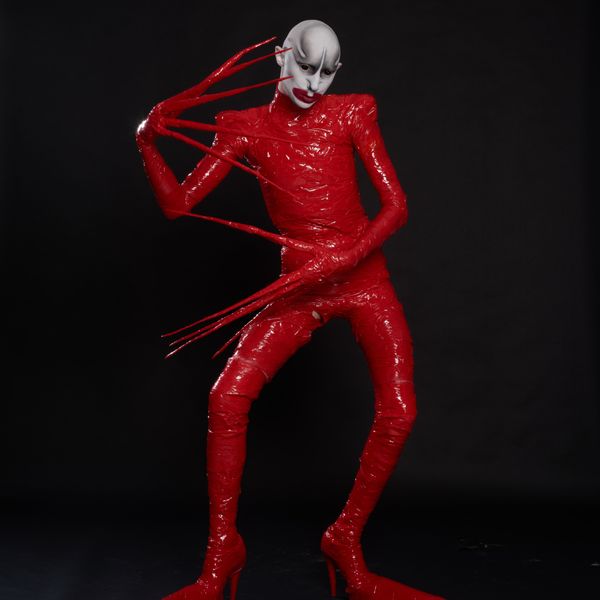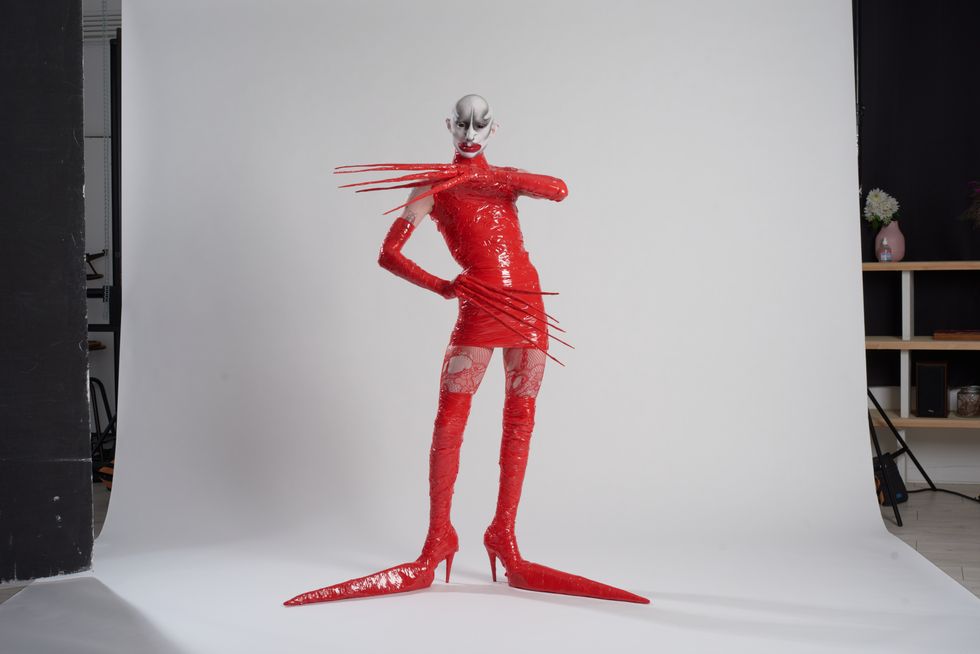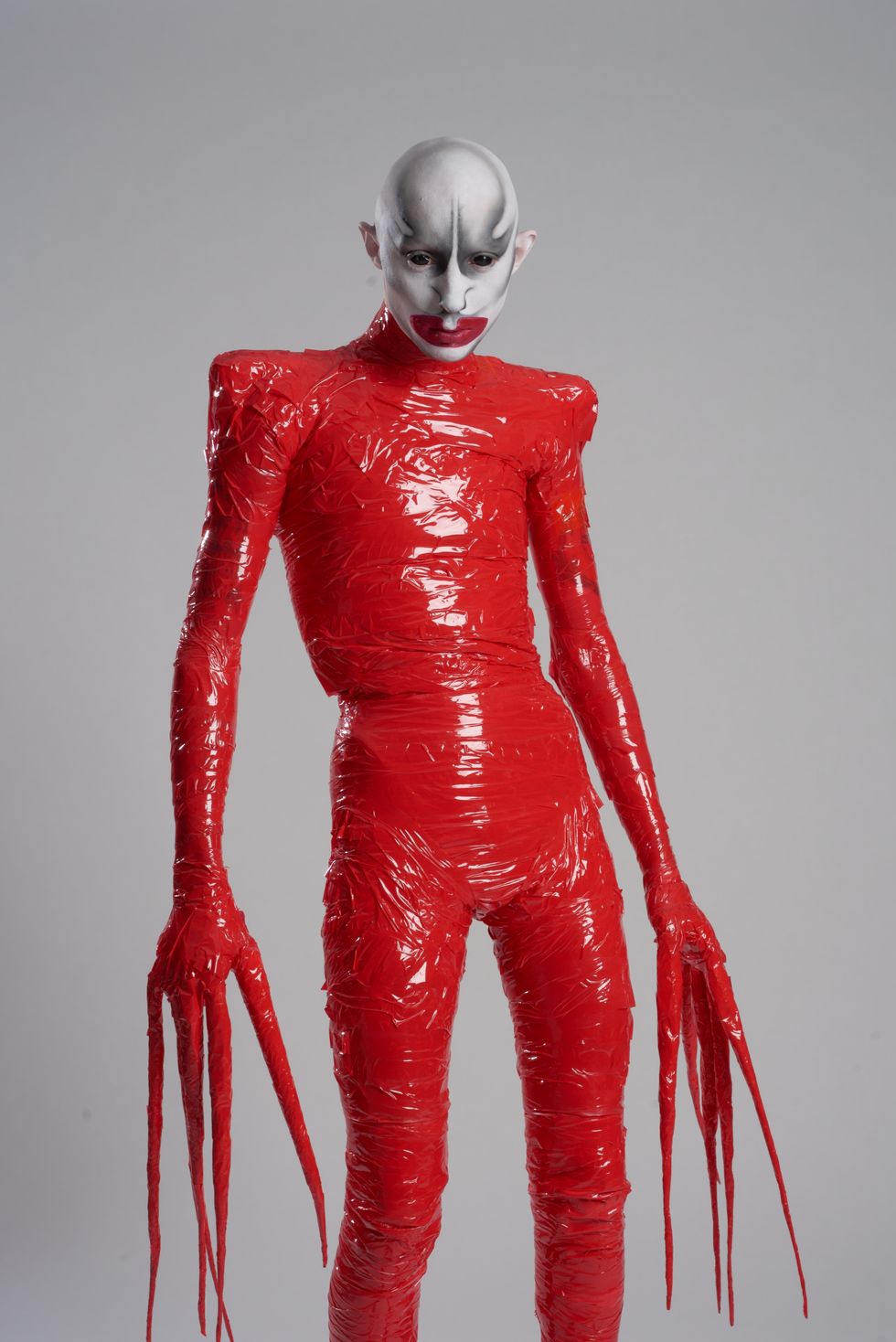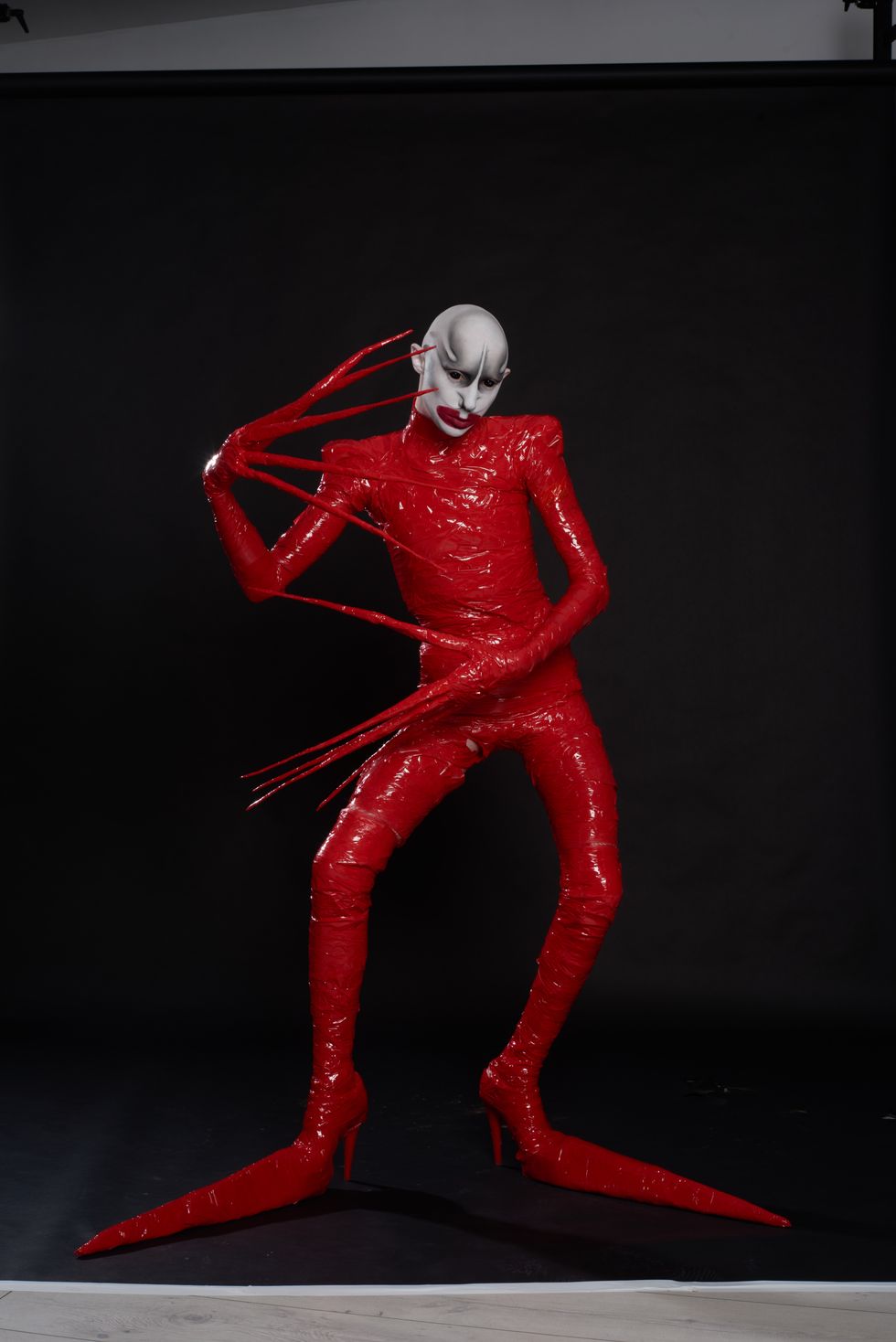
Gena Marvin’s Surreal Queer Art Is Protest
By Arya Roshanian
Jan 29, 2024
“I still think it’s a bit of an illusion,” Gena Marvin tells me with confidence. They’re talking about Paris, where the Russian-born artist has, at the time of our call, lived for less than a year. But the illusion is deceptive. France should, theoretically, be a haven for someone who’s escaped a country with a record of abhorrent human rights violations. Marvin, who is non-binary and uses she/her pronouns when performing, can acknowledge the benefits of being able to wear a dress (made of duct tape or latex) and high heels (ten inches tall) without getting arrested. And yet, they know better than to view their new surroundings with rose-tinted glasses: “There is no absolute ‘safe space’ on Earth for queer people. Not yet.” Because even among the French, who have just elected their first openly gay prime minister, there are plenty of shitheads to watch out for.
Such pessimism isn’t nihilistic or without action. The 24-year-old emerges from a long, storied line of queer performers who blur the lines of art and activism. At a cursory glance, Marvin’s looks boast a similar kind of campiness as Leigh Bowery, with the terrifying what-the-fuckness of Slender Man. Several photos on Marvin’s Instagram show their use of barbed wire as garb, the prongs pushed deep into their calves and thighs, dangerously close to drawing blood. In another, Marvin’s arms are confined within a garment without arm holes, thrusting to break free. Beauty is pain, an agony parallel to those who are marginalized — trapped and coerced into silence.
However, that fantastical, otherworldly being I’ve seen on Instagram is not present during our chat. Marvin, instead, is in street clothes, bald-headed with eyebrows shaved, dewy and with tired eyes. It’s like looking at a blank canvas before it becomes a masterpiece. Marvin’s persona is reticent and laconic. But silent? Absolutely not. Their art speaks for itself. This restrained approach is mirrored in Queendom, a documentary film by Agniia Galdanova that follows Marvin from Magadan — their sleepy hometown in eastern Russia — to Moscow in their pursuit of art-making, protest and, later, freedom. Viewers are like flies on the wall of Marvin’s life, with little interference from the camera crew. We’re beside Marvin as they’re kicked out of a neighborhood grocery in drag for spurring “gay propaganda.” They quietly shed tears on the phone when breaking the news to their grandparents that they’ve been expelled from university for attending a protest.
Despite Russia’s morally questionable practices, Marvin and Galdanova are eager to screen Queendom in their native country; both also acknowledge that this may be impossible. “As of now, it looks very difficult,” Galdanova says. She’s also on the video call with me and Gena’s translator (also a producer on Queendom). “There are a lot of topics that are prohibited in Russia. But we will find a way. I don't know how exactly, but we will find a way to show Queendom in Russia.”
Queendom has, at the very least, found an audience at film festivals across continents. Following its premiere at South by Southwest, it’s since won the NEXT:WAVE award at CPH:DOX, a prize for emerging international filmmakers, in Copenhagen, as well as the Audience Award at the Camden International Film Festival. With a limited release last month in the United Kingdom, Queendom will be released in the US in June 2024 by Greenwich Entertainment.
Speaking with PAPER, Galdanova and Marvin discuss the making of Queendom, leaving Russia and the risks associated with public protest.

Take me back to the beginning of the production process. How did you get in contact with one another for the film? And what did it take to make this film happen?
Agniia Galdanova: I met with Gena, I think in 2020, when I was doing research for a docuseries that I’d planned to do about several drag queens. Gena was one of the potential leads and we met in St. Petersburg. Soon after, I realized I wasn’t going to do the docuseries. Instead, I’d focus on Gena and do a feature about her. So I asked her and she said yes.
Gena Marvin: At the time, COVID was at its worst and I was going through some sort of mental breakdown. And that’s when Agniia appeared in my life. Agniia’s original idea was to make a documentary series, and I said yes. It was sort of perfect timing. I was thinking about starting a new project. It was very serendipitous that Agniia came into my life with the proposal to make a docuseries and, eventually, the documentary feature that turned into Queendom. I really liked Agniia’s approach and ideas, to make a series about the drag queen community in Russia. It seemed really fresh and new, something that no one else was really doing. And that’s why I said yes.
The film is very observational. There aren't many sit-down interviews, nor much acknowledgement of the camera’s presence. It's almost as if the audience is a fly hovering over Gena’s life.
Agniia: I believe that through this form, you can tell much deeper, intimate stories. It's not like sitting down with the person and asking all the questions you want. You’re there with them, experiencing with them. You dive into the life of your subject and get as close as possible. A more honest story comes out of this experience. And Gena was very generous to let me do that, because it also involves more communication between us. We became friends through this process. But it was also hard on many levels, for me and for Gena as well. You let a new person in your life, and now there is someone else following your every move at all times. So I'm very thankful to Gena for allowing us to be next to her for all that time.
Agniia, you captured a lot of footage of Gena at protests, where lots of arrests were made. You were right there witnessing the police brutality and everything. Did you or the rest of the crew encounter any safety issues behind the camera?
Agniia: Well, we discussed all kinds of scenarios for potentially dangerous situations every time we went out to film. We always stayed together in a small group — it would usually just be me, Gena and the cinematographer. So it was easier to navigate. But, for example, that part of the film when Gena was at a protest wrapped in the Russian flag, we were sure we were going to get arrested. Somehow, and luckily, we weren’t. But we were prepared in case we were. And when Gena was arrested on the bridge towards the end of the film, I made sure to get arrested as well so we could stay together. We ended up in the same police car. And our cinematographer was on roller skates. It was very important to us for him not to be arrested so the police couldn’t erase everything we’d filmed. And he’s very good on roller skates.
That’s... so smart. Wow.
Agniia: When we were escorted into the police car, he just skated away.
Gena, I want to know more about that specific look at the protest. You put together an outfit made of tape in the colors of the Russian flag.
Gena: When I started doing drag, I knew that it was something that would change me and was changing me. I wondered how drag could be useful for me, not only as a hobby, but also as a clear objective in my life. And this is something that I was thinking about around that time. There were many events that were happening in my life, major events and changes that were since we started working on this film. It was a difficult time for my country, for Russia. I started to feel some sort of calling coming from within me. I felt an urgency to come out and make a statement, and not to hide behind social media. So at that time, I knew I wanted to do a live performance. We're surrounded by people. And on that particular weekend, Agniia and I were in Moscow, and there were huge protests breaking out there. I felt like this was a calling for me to go out and join. The technique where I wrap myself in tape is very symbolic for me. This is how I convey to people where I stand. And so I decided to wrap myself in the three colors of the Russian flag and to join the crowd in protest.
There were a lot of things that didn't make it into the film. Speaking about the security concerns, we all wanted everything to go smoothly and as safely as possible. But at the same time, that protest we're talking about — the one in support of Alexei Navalny — was a very special one, because it was just so big and unpredictable. It was sort of beyond our planning. We couldn't predict what would happen. We could think about certain things or scenarios that were possible, like that I could go to jail for who knows how long. But, for example, no one knew that I would get expelled from university.
What do you remember most about that night?
Gena: I don't really remember what I felt during the performance. I remember before and after, and what I felt before the performance was that I knew that I wanted to make a statement and I wanted people to know where I stand. After the performance, I remember asking my friends to remove the tape as soon as possible. I’d used tape before in this way, and it’s always painful to remove. But when my friends were removing the tape that night, all the anger I felt and the horrors I went through were being removed as well. It was a spiritual experience after that particular performance, like I had shed all my anger.

I'm curious to know, in your own words, what is it about drag, or queerness in general, that is so threatening to the Russian government?
GM: These are older people, part of an older generation, who have the biggest problem with it, like the administration from the university that expelled me. They’re the ones calling me a fag, telling me that the makeup I wear and the performances I do are very appalling to everyone in our society, and that they’ll do everything to get rid of me, of people like me. They want to show our country that we're nothing and we're not worthy of anything. If we rewind a few years back, when Pussy Riot started and was using performance art as a kind of protest — you could see signs back then of how the government would adopt certain laws to restrict that. And back then, like ten years ago and before, the Kremlin was already cracking down on people who were expressing their views through art and performance. And what Pussy Riot did back then, you can’t do anymore. When I started doing my performances, the situation was already pretty bad. Many more things are now restricted and forbidden.
Queendom also shows your move from Russia to France and the difficulty of obtaining a visa in time. I think there was a two-week window in between that you could obtain the visa and you could leave safely. What did it take for you to finally get the visa in time for you to move to France?
Gena: It did not take me very long to figure out that I didn't want to be in Russia anymore. The morning after Russia invaded Ukraine, I knew it was time to leave. Every day I was trying to get a visa was a nightmare, because I knew I wouldn't be able to come back. I tried to meet with as many friends as I could, knowing that I would probably not see them for a very long time, if not forever. It was also difficult waiting around in Russia. I was in Moscow at the time. And I didn't really know what was happening in the country as a whole, in all the different regions, after the invasion. It’s just so big. But at the same time, I felt that the country I knew was not there anymore. It wasn’t a country, it was an aggressor. Every day was extremely difficult while I waited for my visa. A lot was unknown, but there was a lot of fear — fear of what I was leaving behind, leaving my friends, family and country behind.
How has your art changed since moving to Paris?
Gena: It didn't change much. I'm still the same person as I was before. From my early childhood, every day, I would pray that it would be safe for me. I experienced a lot of bullying and constant attacks on my character. I asked myself, Why can’t I express myself the way I want to express myself? or Why can’t I wear this and that in public? But at the same time, that anger fueled my desire to create art. Arriving in Paris for the first time was extremely difficult for me. I didn't really know what I was doing there or what I was doing in life generally, when I arrived.
I knew the rules of the game, the rules of life, in Russia. Every day I would wake up, and I sort of knew what to expect, even though there were a lot of uncertainties. In France, there's this illusion of a better life. You know, same-sex marriages are allowed there. Police wouldn't arrest you for dressing in drag or wearing high heels in the streets. But I still think it's a bit of an illusion. There's no absolute “safe space” on Earth, and France has its own problems. Regarding my art, I think it is different now. And I wouldn't wouldn't call it drag. I think it’s transformed into something beyond drag. It’s more performance art than drag.
I’m curious to know what inspires your art these days.
Gena: There are people that inspire me, specific artists, artists who do what they want and go against the system. But also those who desire life, those who have a lust for life, also inspire me and my art. Divine, Leigh Bowery, Lady Gaga. But at the same time, I’m a very grounded person. I go to my workshop and see my friends and start working on something new, figuring out how I can channel this sort of everyday routine into art.
Do either of you have a message or anything to say to queer or trans youth or artists in Russia who are not able to leave?
Agniia: With Gena, we made a story. And it's a lot about identity, belonging and community — a queer community in Russia. And that was my initial idea, to open up this door, because it's more and more with the ongoing crackdown of LGBTQ+ rights. In Russia, it's becoming more and more marginalized every day and pushed underground. And with Gena’s story … I don't know how exactly, but we will find a way to show Queendom in Russia. As of now, it looks very difficult. There are a lot of topics that are prohibited in Russia. But we will find a way. It's very important for all of us to reach Russian audiences, to reach the Russian queer community, just to offer some hope. As Gena was saying, she's one of many. She's just a regular person, as all of us are. With her story, I hope that there will be other people who won’t be scared to speak up or to be themselves, to make moves to improve their lives or to change it in the ways they want so they would feel safer and be in a better place. So I hope that there will be better times in Russia. But for people who are not able to leave and who are staying right now in the country, we just wish them to stay safe. Things are not as open as they were, even compared to just a couple of years ago. I hope that queer people in Russia are able to create intimate, safe spaces with their friends where they can stay together and stay themselves. And if our small film could provide support for that, that would be amazing.
Gena: I hope this film can help someone. I was very honest in my life, and I'm very honest in the film. I am never hiding who I am. This is what keeps me sane in France. I just want to tell people to not hide who they are, and to also be careful, especially if you're in Russia. Look around. Safety comes first. The whole [filming] process took so long, so many years, that while filming, our lives changed. Our country changed. And I want to dedicate this film to the queer people who are still in Russia. Even though it’s my personal story, I hope every person who watches it will take something from it.

Photography by Boris Camaca
From Your Site Articles
MORE ON PAPER
ATF Story
Madison Beer, Her Way
Photography by Davis Bates / Story by Alaska Riley
Photography by Davis Bates / Story by Alaska Riley
16 January
Entertainment
Cynthia Erivo in Full Bloom
Photography by David LaChapelle / Story by Joan Summers / Styling by Jason Bolden / Makeup by Joanna Simkim / Nails by Shea Osei
Photography by David LaChapelle / Story by Joan Summers / Styling by Jason Bolden / Makeup by Joanna Simkim / Nails by Shea Osei
01 December
Entertainment
Rami Malek Is Certifiably Unserious
Story by Joan Summers / Photography by Adam Powell
Story by Joan Summers / Photography by Adam Powell
14 November
Music
Janelle Monáe, HalloQueen
Story by Ivan Guzman / Photography by Pol Kurucz/ Styling by Alexandra Mandelkorn/ Hair by Nikki Nelms/ Makeup by Sasha Glasser/ Nails by Juan Alvear/ Set design by Krystall Schott
Story by Ivan Guzman / Photography by Pol Kurucz/ Styling by Alexandra Mandelkorn/ Hair by Nikki Nelms/ Makeup by Sasha Glasser/ Nails by Juan Alvear/ Set design by Krystall Schott
27 October
Music
You Don’t Move Cardi B
Story by Erica Campbell / Photography by Jora Frantzis / Styling by Kollin Carter/ Hair by Tokyo Stylez/ Makeup by Erika LaPearl/ Nails by Coca Nguyen/ Set design by Allegra Peyton
Story by Erica Campbell / Photography by Jora Frantzis / Styling by Kollin Carter/ Hair by Tokyo Stylez/ Makeup by Erika LaPearl/ Nails by Coca Nguyen/ Set design by Allegra Peyton
14 October




